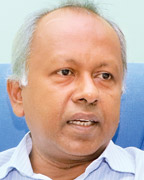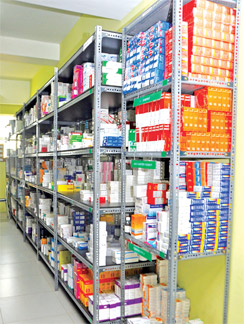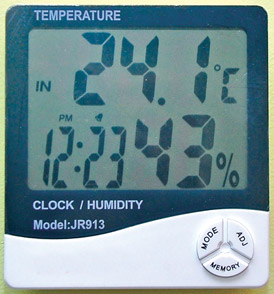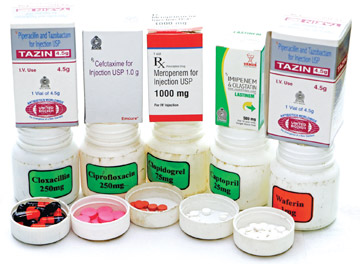Public sector medicines below par?
Private sector ensures minimum standards for storage,
transport; Public sector cannot…
By Husna Inayathullah
Despite the country’s rise to ‘middle-income status’, the population is yet
to access clean and safe pharmaceuticals, a blot on our once-proud health
system. While private sector medical services do ensure minimum safety standards
for pharmaceutical storage and transport, the impoverished state medical system,
which serves the bulk of the population, cannot.
 |
|
Dr. Namal Gamage |

The pharmaceutical storage mechanism within the state sector is not safe and
does not conform to the proper methods in transporting and storing the drugs in
hospitals, a senior consultant says,
“Government health institutions all over the country have to use their own
vehicles to transport their required drug quota from the Medical Supplies
Division (MSD) in Colombo. Almost all these vehicles – generally, lorries, are
devoid of air conditioning. Anyone can imagine what happens to the quality of
drugs stored inside these vehicles for over 24 hours in soaring temperatures,
during their long journey from the MSD to their respective institutions,”
Consultant Cardiothoracic Surgeon, Teaching Hospital, Karapitiya, Dr. Namal
Gamage says.
Transportation
These lorries reach the MSD in the morning with hospital pharmacists. They are
parked at the MSD premises under the hot sun. Pharmacists start collecting
various items from various outlets of the MSD and stacks them in the lorries.
Drugs, gauze, saline, surgical consumables, are among the items. Lorries remain
parked the whole day until this process is over, and leave MSD in the afternoon.
The loaded items are not unloaded the same day at the provincial hospital, but
the following day morning only, according to Dr. Gamage.
“The Health Department should understand the importance of storing drugs in the
proper manner until they reach the patient,” he said, in an interview with the
Sunday Observer.
Dr. Gamage said, the drugs are transported in lorries with no air conditioning,
which is contrary to Parliamentary Act No 27 of 1980, according to which drugs
have to be transported in air-conditioned vehicles. The National Medicinal
Product Regulatory Authority (NMRA) has been established according to this Act.
He stressed that all drug labels state they should be kept below 30 to 25
degrees to safeguard the active materials contained in the drugs. “The public
must be made aware of this pathetic situation where drugs are transported in an
unsafe manner, which could cause ill-effects. Medical students and
pharmaceuticals have forgotten what they have studied. I have made several
complaints to the Health Director regarding the unsafe method of transporting
drugs, but it has been of no avail,” Dr Gamage said.
 |
|
"Sri Lanka being a tropical country, generally, has ambient
temperatures above 30 degrees Celsius and during daytime may reach much
higher. Almost all drugs must be kept below 30 to 25 degrees Celsius all
the time to avoid decomposing active ingredients which are not heat
resistant. Therefore, air conditioning is a must for any place where a
drug is kept for any length of time." |
“Reputed multinational drug companies always have mechanisms to safeguard their
drugs from various adverse conditions which could occur throughout the long
journey of transportation. Therefore, automatically, the prices of such drugs
stay high. It is one reason why company drugs are expensive in the open market.
Companies are blamed, but they survive and thrive, as they provide quality drugs
to patients. They are the only quality drug providers we have,” the doctor said.
Temperature
If doctors come to know that a particular brand of drug is not as effective,
they are reluctant to prescribe that brand, which could be detrimental to the
sustainability of the company. Therefore, companies are aware they must be
vigilant to preserve the quality of the drugs for their own sustainability. In a
life and death situation, doctors do not take a risk but use the best available
brand of the required drug, but of course the patient must be able to afford it,
Dr. Gamage said.
 “Sri Lanka being a tropical country, generally, has ambient temperatures above
30 degrees Celsius and during daytime may reach much higher. Almost all drugs
must be kept below 30 to 25 degrees Celsius all the time to avoid decomposing
active ingredients which are not heat resistant. Therefore, air conditioning is
a must for any place where a drug is kept for any length of time. In this
country, especially, when transporting drugs during daytime in a closed vehicle
with no air conditioning, the temperatures could rise up to 80 or 90 degrees
Celsius,” he said. “Sri Lanka being a tropical country, generally, has ambient temperatures above
30 degrees Celsius and during daytime may reach much higher. Almost all drugs
must be kept below 30 to 25 degrees Celsius all the time to avoid decomposing
active ingredients which are not heat resistant. Therefore, air conditioning is
a must for any place where a drug is kept for any length of time. In this
country, especially, when transporting drugs during daytime in a closed vehicle
with no air conditioning, the temperatures could rise up to 80 or 90 degrees
Celsius,” he said.
Dr. Gamage said, the NMRA is empowered to issue licence to drug transporting
vehicles in Sri Lanka. The NMRA officials check the vehicle’s proper functioning
of air conditioning before they issue the permit which is given only on an
individual basis, for the RMV registration number of the vehicle. “Any private
vehicle transporting drugs without such licence will be raided and seized by
Food and Drug Inspectors (FDI) even if the vehicle is suitably air conditioned
for the purpose. If found guilty in court, the victim is fined up to Rs. 100,000
and the person responsible must publish, clearly shown apologizing notices in
three well known daily newspapers, in the three mediums,” he said.
He said, most of the time, doctors are blamed for using branded drugs which are
expensive and have to be bought from outside, but it is the only alternative
available. “Company drugs are protected twofold, by the company mechanism and by
the government law. Government drugs are not protected by either mechanism.
The government must provide a solution to this issue by supplying
air-conditioned trucks. It is not something impossible for the government to do.
The government spends a huge amount of money annually for importing drugs but it
is a waste”, he added.
The private sector
 |
|
Kelum Gimendra Jayasuriya |
The Sunday Observer also spoke to an official of the Pharmaceutical Society
of Sri Lanka (PSS) to find out about the storage, transportation and
distribution facilities of medical drugs in private hospitals. According to him,
the Drug and Therapeutic Committee introduced by the World Health Organization
(WHO) and the NMRA are responsible for the quality control of the drugs. “The
main problem in Sri Lanka is that people go for brand names of drugs prescribed
by doctors and this causes inconvenience to them. The quality of the drugs
differs with the brand name, because extra ingredients are added to them,” he
said.
Manager, Quality Standards for Asiri Group Pharmacy Services and Vice President
of PSS, Kelum Gimendra Jayasuriya, said, “The private health sector gets the
accreditation of quality drugs through a process called Joint Commission
International (JCI) which looks into patient safety and the quality of the
drugs. The Medication Management and Usage (MNU) and Prevention and Control of
Infection (PCI) approval under this accreditation are mandatory. We do not sell
or approve any drugs not approved by the NMRA. A new drug introduced to the
market should be approved by the Food and Drug Authority (FDA). It has to
undergo four phases, but it is sad to say that Sri Lanka does not proceed after
the third phase. The last phase is known as Post Marketing Surveillance which
the Sri Lankan drugs do not undergo,” he said
Jayasuriya added; “We do not accept drugs from suppliers if they do not possess
an NMRA licence and approval. We have an application form in the private
hospitals which the medical suppliers should fill and get it endorsed by the
NMRA and a doctor, and we do it in order to look into quality control,” he said
“A drug’s efficacy should be the same until its expiry. We do not take in brands
more than seven and ensure that we have the original brand. We have a process to
identify quality failure. At least one or two quality failures per month are
reported. The prescription pattern in Sri Lanka where antibiotic is prescribed
for a minor and a major problem is incorrect. We inspect warehouses and
suppliers and assure that they have air conditioning to safeguard the quality of
the drugs.
We depend on the government for vital drugs, but sometimes they too go out of
stock,” Jayasuriya said. The WHO says, we have to control the humidity to
safeguard the quality of the drugs, but it does not happen everywhere. “The WHO
and the government also advise that no drugs should be stored on the
refrigerator doors. We have record temperatures and alarm bells in private
hospital warehouses to make sure that the temperature is at the correct level.
No fluctuation happens in temperature in private hospitals, and we have
generators as well. We safeguard our drugs from adverse conditions and that is
why we have a high demand when compared with the government sector,” he said. |

